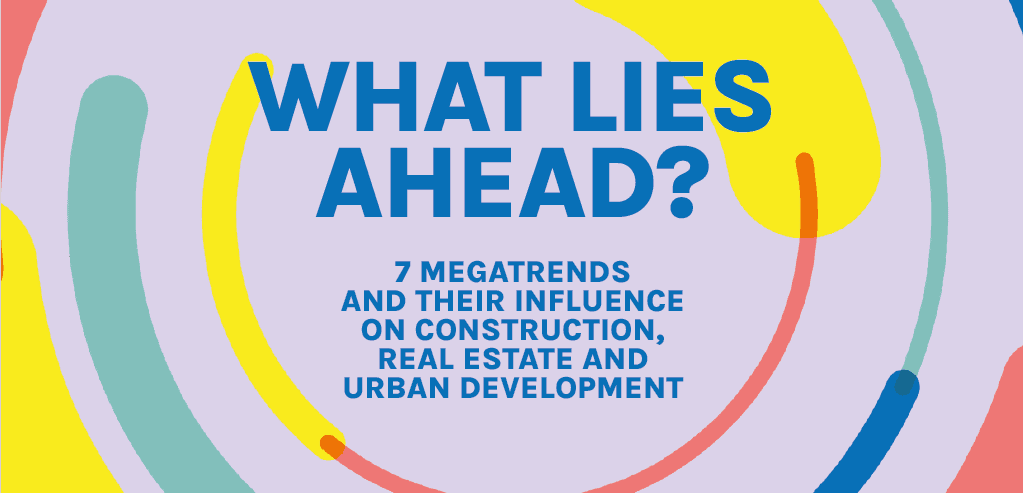
What are the expectations of the French public in terms of quality of life and ecological transition?
4 minutes of reading
As the 3rd survey* carried out by the Observatory of Uses and Representations of Territories confirms, living in the city increasingly appears to be an oxymoron, and the desire to migrate is intensifying among the hyper-urban population. This is a powerful trend, and the pandemic seems to have accentuated the discontent, intensified the search for a new work/life balance, and even in certain cases to have created conditions that are more conducive to turning these desires into reality.

The 3rd survey of the Observatory, which was created in 2017 by ObSoCo and Chronos and is supported once again this year by ADEME and Bouygues Construction, highlights the way in which the French are redefining their needs in terms of their quality of life. What do they expect from their territory?
While their expectations in terms of ecology are increasing, and for a majority of people the link between the environment and contemporary lifestyles has been clearly shown, what are people willing to change on an individual level? What challenges are explicitly posed to territories and especially to cities? And finally, what resilience strategies are considered acceptable?
The aim of this survey is to gain a better understanding of the new desires and aspirations of the French public in order to provide keys for rethinking territories and ways of building cities, bringing them together and enabling the creation of conditions for a good, not to say better, quality of life which is in tune with the challenges of the ecological transition and climate change.
The desire to move has grown stronger: has this been leveraged by the public health crisis?
More than one in two French people (55%) would prefer to live elsewhere, an increase of 7 points compared to 2017. Along with this desire to live elsewhere, a significant number of people will potentially take action: 63% of those who would rather live elsewhere are seriously considering doing so within 5 years, including 31% who are certain, which represents 17% of the overall population. By extrapolation, this means that 14 million French people would like to move in the next few years, 7.7 million of whom envisage certainly doing so.
The public health crisis seems to have strengthened these aspirations, just as it is likely to accelerate the realisation of them. 60% of those who had a poor experience of lockdown would like to live elsewhere. By comparison, this falls to 49% for those who had a good experience. Similarly, the unprecedented growth in remote working during the pandemic appears to have had an impact: 63% of those able to work from home say they would like to live elsewhere, compared to only 54% of those whose jobs do not enable them to work remotely.
For the better-off, having a second home can also help to reconcile the amenities of the city with a desire for peace and quiet. Thus, 13% of those who can work remotely are considering the purchase of a second home, compared to 6% of those who cannot work from home.
While remote working appears to be a lever for people to turn their desire to move into reality, many people in employment also say they would be willing to change their professional situation in order to move to their ideal surroundings. 44% of those in work who would like to move might consider changing their professional situation in order to do so: 22% would change their employers, 13% would change their jobs or sectors completely, and 9% would give up work altogether. We have all seen how since the very start of the pandemic, it has tended to make people rethink their priorities ; here is a further indication that the impact on territories may not be so insignificant.
It is clear that there are movements on the horizon which may also accentuate social divides. Along with having access to a second home, being able to work remotely remains the prerogative of the higher socio-professional categories, where it is much more widespread (66%), than among the lower socio-professional categories (25%). It is also among the lower income categories of the population that financial issues represent the chief obstacle to people’s ability to move.
Cities in crisis
A real crisis of the city, and especially of the hyper-city, is emerging behind these aspirations. While 55% of French people would like to move to live elsewhere, this aspiration is particularly strong among city dwellers: it concerns 71% of people living in the Paris region and 62% of people living in cities that are part of larger metropolitan areas.
Associations connected with the city have deteriorated further compared to the first Observatory survey in 2017; while it still appears to be a functional territory, it is increasingly less human. Cities are acknowledged for their wide range of shops, leisure and cultural activities and jobs, but the French do not see them as good places to grow old, to raise their children, or simply to thrive.
67% of those surveyed believe that cities are places where It is not pleasant to live (including 36% who say not pleasant at all).
What city dwellers in search of an alternative seem to be missing the most is contact with nature, a healthy environment and space. This has strengthened the appeal of small and medium-sized towns, with respondents to the survey highlighting their ability to offer peace and quiet to their residents while ensuring smooth mobility and proximity to a number of amenities. Ideally, 28% of them would prefer to live in a small town or village on the outskirts of a large city, 19% in a medium-sized city and a similar number in a small town or village located far from a major urban centre. By contrast, people clearly no longer dream of living in large cities or metropolises: 9% would like to live in a city centre, 9% in the outskirts of a city. Looking at all the answers carefully, it seems that people want to de-escalate the ladder of urban living, and go one rung lower.
The strong desire to live close to nature resonates with the 26% of those surveyed who mention “a healthy environment” as an important criterion for their ideal surroundings. For nearly one person surveyed in ten, this is cited as the number one criterion. When asked to specify the attributes of this aspirational territory, for 65% of those questioned, it is to live in an unpolluted environment. “Pollution” is, in fact, the term most frequently associated with the city – again an increase compared to 2017.
This is the context in which to understand why 81% of those surveyed found introducing or developing nature in cities important (this includes 36% for whom it is very important, and 42% of residents of large cities). It is as if nature appeared to be a major lever of resilience for territories. The respondents believe that nature in cities can provide a large number of benefits, combining environmental protection with positive effects on health and well-being.
Territories and the challenge of ecological transition
The quest for new life balances at an individual/micro level seems to echo strong expectations at a more global/macro level. It is well known that environmental concerns have only increased in the minds of the French public over the last few years, and it is precisely because this concern is now linked to people’s daily lives that it is so strong. Indeed, 70% of respondents said they are worried about the potential consequences of climate change on the quality of life in their region (including 18% who are very worried). This concern was even more pronounced among the youngest people, a quarter of whom said they are very worried, as well as among people living in densely populated areas.
Fears about climate change appear to be many and varied, including heat waves (48% cited this as the most worrying phenomenon), violent storms and rain (45%), drought (34%) or floods (30%).
For 37% of those concerned, this anxiety is likely to make them reconsider where they live. The confidence of the French public in the resilience of their territories to the consequences of climate change is quite relative: 33% are confident (although only 3% are completely confident), while on the other hand 50% are not (including 15% who are not at all confident). Some geographical variations are evident: Brittany, Burgundy-Franche Comté, the Loire Country and New Aquitaine have a higher level of confidence than Auvergne-Rhône Alpes, the Paris region and Provence-Alpes-Côte d’Azur. On the other hand, very few differences depend on the size of the conurbation.
In light of this, we showed the respondents a certain number of strategies intended to bring about the ecological transition of territories and, in particular, of cities. Among these, the most widely known (by slightly more than one person in two) and also the most credible, effective and desirable, is the greening of buildings. Less well-known (familiar to almost a third of those surveyed) but also considered credible, effective and desirable once explained, were urban agriculture and eco-neighbourhoods. Similarly, although still a little less well-known, was the strategy of zero net land artificialisation (which suffers from a very low level of awareness). As far as congestion charges are concerned, they are better known (37% awareness), but are considered credible, effective and desirable by only a small majority.
Desires to live elsewhere, part of a desire to change lifestyles
While a majority of French people fear the impact of climate change on the quality of life in their territories, there is also a clear link in people’s opinions between the state of the environment and climate and contemporary lifestyles. As a result, 89% of those questioned in our Observatory believe that lifestyles need to be changed. One person in five calls for a radical change (20%), 40% believe that major changes should be made and 29% consider that only a few changes are required.
What can be considered to be individual ecological transitions have already begun. Questioned about their willingness to make a number of lifestyle changes – in terms of consumption, housing, mobility or holidays and leisure – a significant proportion of those surveyed, ranging from one in 10 to one in three, said they had already made such changes. A large majority also say they are ready to change, and this is without doubt also what is behind the desire to settle elsewhere.
It should be noted, however, that these intentions tend to be relatively weak (more people say they are “somewhat” ready to change than say they are “absolutely” ready to do so). This certainly suggests a slow pace of change, as is generally the case for behavioural change.
There are also opinions which, although in the minority, are nonetheless sometimes very polarised and express real reluctance on certain subjects (for example, 1 in 10 French people are not at all prepared to significantly reduce their meat consumption, the same number are not at all prepared to reduce their use of electronic devices, 17% are not at all prepared to reduce or give up the use of their cars, etc.).
It is clear in this context why public and private players are increasingly being called upon to act. When the French change or show a willingness to change, they turn to them to help them do so, but also to play their part more collectively. The scope and difficulty of the task of supporting, not to say initiating, these transitions, which require a rethink of the way in which urban players position themselves and create “territorial value”, can then be appreciated.
*Methodology of the survey
The 3rd Observatory of Uses and Representations of Territories is based on a survey of a representative sample of 4,000 residents of metropolitan France aged between 18 and 75.
The survey was conducted online by ObSoCo using the Respondi panel from June 17 to 30, 2021.
The representativeness of the sample was established according to the quota method on the basis of the following criteria: age, gender, region and size of the urban area of residence, socio-professional category and level of education.
In order to ensure that the different strata of the territory were represented correctly, the sample was established not only at national level but also at regional level. When the fieldwork was completed, the data was adjusted (first regionally and then nationally) for all the criteria used for the quotas.
More reading
Read also




What lies ahead? 7 megatrends and their influence on construction, real estate and urban development
Article
20 minutes of reading

